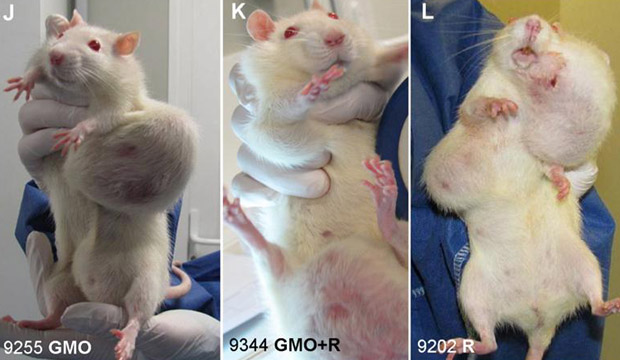 In the first ever study to examine the long-term effects of Monsanto’s Roundup herbicide and the NK603 Roundup-resistant GM maize also developed by Monsanto, the CRIIGEN scientists found that rats exposed to even the smallest amounts, developed mammary tumors and severe liver and kidney damage as early as four months in males, and seven months for females, compared with 23 and 14 months respectively for a control group.
In the first ever study to examine the long-term effects of Monsanto’s Roundup herbicide and the NK603 Roundup-resistant GM maize also developed by Monsanto, the CRIIGEN scientists found that rats exposed to even the smallest amounts, developed mammary tumors and severe liver and kidney damage as early as four months in males, and seven months for females, compared with 23 and 14 months respectively for a control group.
The report states: “Similar degrees of pathological symptoms were noticed to occur from the lowest to the highest doses suggesting a threshold effect. This corresponds to levels likely to arise from consumption or environmental exposure, such as either 11% GM maize in food, or 50ng/L of glyphosate in R-formulation [the lowest concentration of Roundup in the rats’ drinking water] as can be found in some contaminated drinking tap water, and which falls within authorized limits.”
The research findings raise serious questions about the current regulatory process for licensing industrial chemicals, pesticides and other novel crops. The scientists observe that all GM crops have been approved safe for consumption on the basis of 90-day animal feeding trials. They also point out that only Roundup’s active principle, glyphosate, has been tested rather than the commercial product, which includes ingredients that enable the glyphosate to penetrate plants more efficiently.





 The U.S. government has given an ultimatum to the international group that helps provide vaccines to...
The U.S. government has given an ultimatum to the international group that helps provide vaccines to...






























